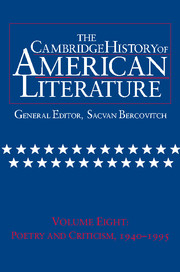Book contents
- Frontmatter
- Introduction
- Poetry, Politics, and Intellectuals
- Criticism since 1940
- Introduction
- 1 Politics and American Criticism
- 2 The Emergence of Academic Criticism
- 3 The Nationalizing of the New Criticism
- 4 The Canon, the Academy, and Gender
- 5 Deconstruction and Poststructuralism
- 6 From Textuality to Materiality
- 7 Cultural and Historical Studies
- Conclusion: Academic Criticism and its Discontents
- Appendix II: Biographies of Critics
- Chronology 1940–1995
- Bibliography
- Index
Introduction
from Criticism since 1940
Published online by Cambridge University Press: 28 March 2008
- Frontmatter
- Introduction
- Poetry, Politics, and Intellectuals
- Criticism since 1940
- Introduction
- 1 Politics and American Criticism
- 2 The Emergence of Academic Criticism
- 3 The Nationalizing of the New Criticism
- 4 The Canon, the Academy, and Gender
- 5 Deconstruction and Poststructuralism
- 6 From Textuality to Materiality
- 7 Cultural and Historical Studies
- Conclusion: Academic Criticism and its Discontents
- Appendix II: Biographies of Critics
- Chronology 1940–1995
- Bibliography
- Index
Summary
During the past decade or more, the field of literary studies has been a notoriously embattled one. The debates within and around it, sometimes referred to as “the canon wars” or “the culture wars,” have expressed in various ways the identity conflict not only of our academic discipline but of the contemporary American society and culture of which it is a part. Our account of criticism since 1940, like the other contributions to this Cambridge History of American Literature, was composed in the midst of these debates. One of the tasks we set ourselves, accordingly, was to situate the debates historically, to provide a narrative of the developments in modern literary, language, and cultural theory that have helped produce the current struggles, and to illustrate the relations between our cultural, institutional, and disciplinary moment and previous moments within the last fifty years.
This history argues that many of the contested issues in contemporary literary studies – issues that sometimes are represented as posing an unprecedented crisis for the discipline – not only have been repeatedly debated in different terms at earlier moments in our period but are, in fact, inseparable from the discipline itself. Often, these issues have been expressions of a central and longstanding tension in the discipline between the impulse to rigorously define and circumscribe the field, laying professional claim to a distinctive set of literary objects, interpretive procedures, and evaluative criteria, and the competing impulse to broaden and extend the discipline’s borders. Concerned with these conflicting impulses, our account of the principal critical theories, methods, and movements of the past half century pays particular attention to the academicization of criticism, its causes, consequences, and controversies.
- Type
- Chapter
- Information
- The Cambridge History of American Literature , pp. 261 - 264Publisher: Cambridge University PressPrint publication year: 1996
- 1
- Cited by

